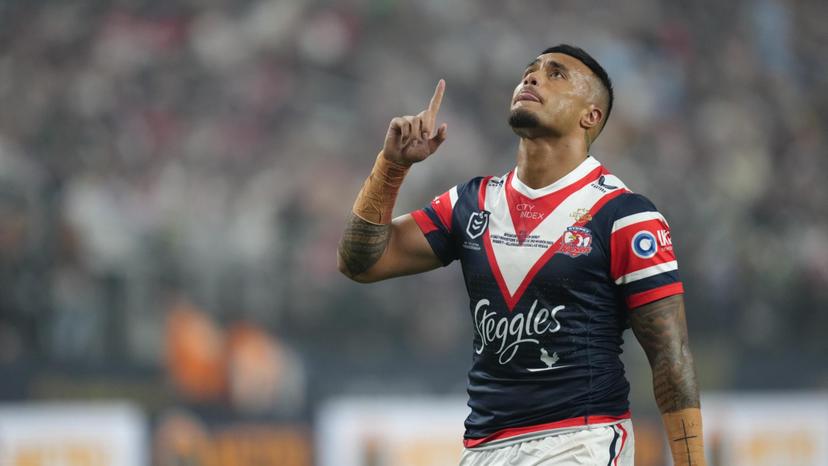Sydney Roosters coach Trent Robinson firmly asserts that Spencer Leniu is not a racist and hopes that the aftermath of his eight-match suspension for referring to Brisbane’s Ezra Mam as “a monkey” can spark a pivotal shift in the use of language both in sports and society.

The Samoan international admitted to using the slur during the opening round game in Las Vegas but reiterated to the judiciary panel on Monday night that it was not meant to be racially motivated. He explained that it was a term used in jest by him and others.
Robinson stated that the club has acknowledged the verdict and sees no value in disputing the punishment, despite public and private debates about it.
“In regards to the incident, my stance is clear: anyone who perceives Spencer as racist is mistaken,” he affirmed.
If we grasp the concept of racism, it involves utilizing one’s power to diminish and degrade someone of a particular class or background.
“If anyone believes that an immigrant, whose parents hail from Samoa and New Zealand and resides in Mt Druitt, is attempting to exert power over others to belittle them, then they’re completely mistaken. He is not racially prejudiced. The focus was on his language usage. If individuals believe they have the authority to sit in judgment of others based on their speech in society, then that’s where I take issue.”
“Mam presented a comprehensive statement to the judiciary, spanning twelve paragraphs, detailing the emotional distress he and his family endured.

Leniu admitted during the hearing that it wasn’t until the following day when an Indigenous woman explained the term’s offensiveness to him that he truly comprehended its impact.”
“It has been a profound and transformative experience for him,” Robinson remarked regarding Leniu, who was making his debut for the club.
“This past week has been incredibly humbling for him. He has maintained a demeanor of respect and honesty throughout, never once questioning the consequences or any aspect of the situation. It’s now a time for him to move forward and grow.”
Robinson admitted that he misspoke in the post-match press conference when he said, “he (Mam) obviously made the complaint but that doesn’t mean it’s right.” He acknowledged that he should have handled it differently, clarifying, “We didn’t receive any communication about the incident in Vegas, which is why I went into that press conference unsure of what had transpired on the field. I felt like judgment had already been passed, and I wanted to emphasize the importance of due process, but the wording I used was incorrect.”
The issue of preconceived guilt has stirred significant debate within rugby league circles over the past 10 days, with several prominent figures advocating for Leniu to face a 12-match ban before his judiciary hearing took place.
When questioned about whether this practice should be reconsidered in the future, Robinson offered a measured response, noting, “This wasn’t a typical high tackle scenario. It had far-reaching implications for society as a whole. What was under scrutiny here wasn’t just our sport, but the language we use, with racism at the forefront.”
He expressed understanding for individuals speaking out passionately on matters that deeply affect them, but emphasized the need for the NRL to maintain authority over such situations. Robinson suggested, “When it veers into making judgments on NRL actions, that’s the NRL’s prerogative to address. They must either take action or risk allowing these boundaries to blur, leading to widespread pre-judgment before hearings.”

Robinson envisions this incident sparking a broader societal shift away from language that, while not necessarily intended to cause harm, has become unacceptable in any context.
“This is fundamentally a matter of language. It’s a form of communication that’s unfortunately widespread, not just among various age groups, but particularly ingrained in sports culture from a young age, continuing through playground banter into adulthood,” he remarked, speaking a day after Manly’s Haumole Olakau’atu disclosed being called “coconut” repeatedly on the field.
“The use of such language isn’t necessarily indicative of racism or an attempt to exert power; it often stems from camaraderie among peers. I’m not condoning it, but this is what’s under scrutiny. We must transform the way we interact linguistically.”
“To label Spencer as racist couldn’t be further from the truth. However, the language being used— that’s unacceptable. Yet, is it a pervasive occurrence in our daily interactions? Unfortunately, yes,” he continued.
“This instance must serve as a catalyst for change in how individuals within the same social circles and communities communicate. Such language norms cannot persist.”
“The vocabulary we accept now differs greatly from what was deemed acceptable 20 or 30 years ago, and we need to evolve beyond this.”
